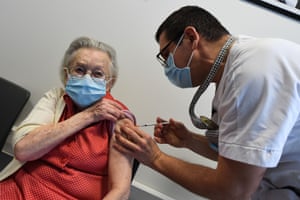
Denmark extends lockdown for a fortnight
Denmark has extended a hard lockdown for two weeks, until January 17, to limit the spread of COVID-19, following a drastic spike in new infections over the past month, the country’s prime minister said on Tuesday.
The situation regarding infection rates, hospitalizations and deaths is now even more serious than in the spring,” Prime Minister Mette Frederiksen told a press briefing.
The extension of the current country-wide restrictions announced on December 16 will keep schools, shopping malls, restaurants, bars and other non-essential shops closed, Frederiksen said.
The Nordic country has fared relatively well through the pandemic until December, when the number of new infections more than doubled compared with the previous month. “The scenario we feared in the spring may become a reality in the coming weeks and months if we don’t act now,” Frederiksen said. Denmark on Tuesday reported 2,621 new cases among its population of 5.8 million over the past 24 hours, while the number of new hospitalisations rose by 28 to a record 900, close to the maximum capacity of its COVID-19 wards.
France sees rise in people admitted to hospital for Covid-19
The French health ministry reported 11,395 new coronavirus infections over the past 24 hours on Tuesday, jumping above the 10,000 threshold for the first time in four days.
France, which launched its gradual vaccination campaign on Sunday, saw the number of people hospitalised for the disease rise for the fourth day running, a sequence unseen since November 13.
France’s cumulative total of cases now stands at 2,574,041, the fifth-highest in the world.
The seven-day moving average of new infections, which averages out weekly data reporting irregularities, stands at 11,871, more than twice as high as the government’s target of less than 5,000.
The COVID-19 death toll was up by 969, at 64,078, versus a seven day moving average of 339.
Updated
at 2.08pm EST
A man charged with two counts of murder in the deaths of a couple in the US has died from COVID-19 complications while in custody awaiting trial, an official said.
Craig Pennington, 56, died at Norton Healthcare in Louisville, Marion County Detention Center Chief of Security Irvin Mann told news outlets.
Mann said Pennington was hospitalized on Dec. 11 for shortness of breath and tested positive for COVID-19 while hospitalised.
Pennington was charged in July 2016 with killing 38-year-old Robert K. Jones and 35-year-old Crystal J. Warner.
Warner and Jones, both of Florence, went missing July 3 and their bodies were later found in different counties.
Pennington had pleaded not guilty to murder and other charges and was scheduled for a pretrial conference on Jan. 15, according to court records.
Ten out of about 215 inmates at the jail were infected with COVID-19 as of Tuesday morning, Mann said.
Ireland records highest daily tally of cases
Ireland reported the highest Covid-19 cases in a single day on Tuesday with 1,546 infections, up from a previous record of 1,296 on Saturday.
The government is to meet on Wednesday to consider additional restrictions to try to control a surge that began after public health measures were eased in early December when Ireland had the lowest infection rate in the European Union.
Updated
at 1.32pm EST
Nigeria faces oxygen supply challenges to treat coronavirus patients in parts of the country and unacceptable laboratory delays as case numbers rose to the highest recorded in a single week, health authorities said.
The warnings from officials come as the resurgent virus strikes across much of the world, bringing greater case loads and hospitalisations.
“There is an on-going review of the chain for the supply of medical oxygen for our medical facilities across the nation,” said Boss Mustapha, chairman of Nigeria’s coronavirus task force, naming the capital of Abuja as an area of concern.
Labs’ “inability to function optimally has resulted in unacceptable levels of delay in receiving results,” he added, calling on Nigeria’s state governments to reopen all laboratories, ensure prompt testing and keep open treatment centres.
“This is not helping our national response.”
Nigeria has recorded few coronavirus cases compared to others on the continent.
Since the beginning of the pandemic, officials count 84,811 as of Tuesday evening, with 1,264 deaths.
A senior US public health official said on Tuesday the coronavirus testing the United States now is requiring for travellers from Britain should probably be extended to other countries as well.
“I think that probably should be extended to other countries,” US assistant secretary for health Brett Giroir told MSNBC.
Only four in 10 people in France plan to get Covid vaccine
Just four in 10 people in France want to have a vaccination against Covid-19, a poll showed Tuesday, as concern also grows over the slow start to the country’s immunisation campaign.
According to the poll by Ipsos Global Advisor in partnership with the World Economic Forum, just 40% of French people want to have the vaccine.
This puts it behind even other laggards like Russia on 43% and South Africa on 53%, let alone those countries where eagerness to have the vaccine is high such as China on 80% and Britain on 77%.
Fear of side-effects is the reason most often given for not wanting the vaccine, according to the poll.
In the United States, where a mass vaccination campaign has now begun in earnest, 69% of people now want the vaccine, a rise on October.
France began its vaccination campaign on Sunday along with most of the rest of the EU, targeting residents in care homes first, Agence France-Presse reports.

A resident of a retirement home receives a dose of the Pfizer/BioNtech Covid-19 vaccine in Loos, northern France, on 28 December, 2020 as the country starts its national vaccination campaign to fight against the spread of coronavirus. Photograph: François Lo Presti/AFP/Getty Images
However fewer than 100 people were immunised in the first three days in France, a far slower pace than in neighbouring Germany, let alone in the US or UK.
Rebuffing criticism on social media, a health ministry official said: “We have not set out for a 100-metre sprint but a marathon.”
“The start is cautious but we will step it up and vaccinate on a very wide scale,” the official said, noting that the authorities face a “very strong scepticism on the part of the French population”.
The official said there was no problem with supplies, with 500,000 vaccine doses now set to arrive in France every week.
Updated
at 1.25pm EST
Kamala Harris, the vice-president-elect of the US, has received the coronavirus vaccine.
‘That was easy’: Kamala Harris receives Covid-19 vaccine – video
Updated
at 12.53pm EST
Chile records first case of coronavirus variant
Chile said on Tuesday it had recorded its first case of the British variant of coronavirus, prompting health authorities to reinstate a mandatory quarantine period for all visitors entering the South American nation from abroad.
The variant, which could be up to 70% more transmissible, has spread rapidly from Britain, where it was first identified, to countries across the globe, including Pakistan, Hong Kong, Singapore, Canada and Israel, among others.
The Chilean undersecretary of health, Paula Daza, said a Chilean woman who returned to her home country on 22 December after having travelled to London had tested positive for the variant.

People sit in bar terraces in downtown Santiago, on 23 December, 2020. Photograph: Claudio Reyes/AFP/Getty Images
Once in Chile, she boarded another plane to the south-central city of Temuco. Her movements prompted a scramble among health authorities in Chile to track down those she may have contacted during her journey, Reuters reports.
Daza said the woman was asymptomatic, in quarantine and in good health.
Her arrival, however, prompted authorities to mandate a 10-day quarantine for all visitors to Chile, beginning on 31 December.
Travellers can take a PCR test beginning on day seven of the quarantine period.
If negative, they would be released from quarantine, Daza said.
The World Health Organization (WHO) says there is not enough information to determine whether the new variants could undermine vaccines being rolled out internationally.
Updated
at 1.23pm EST
My colleague Jonny Weeks returned to University hospital in Coventry, England in the week the Covid-19 jab started being rolled out for this photo essay.
University hospital is one of about 70 hospitals around the UK participating in the vaccine rollout.
Initial priority is being given to people aged over 80, care home workers and vulnerable NHS staff. Every day, about 300 people are being vaccinated at University hospital alone.
Brazil’s government has extended zero import taxes on 298 products considered essential in the fight against the Covid-19 pandemic for six more months, the country’s foreign trade authority, Camex, said on Tuesday.
In a statement on the economy ministry website, Camex said the zero import tax rate on a range of products covering medicines, supplies and testing equipment for virus detection and vaccines will be extended to 30 June next year from the previous cut-off of 31 December this year, Reuters reports.

Members of Brazilian police patrol in front of closed stores due to the coronavirus pandemic at 25 de Marzo street, the major commerce centre in São Paulo, Brazil, 26 December 2020. Photograph: Sebastião Moreira/EPA
That should increase the supply of medicines and supplies, reduce the cost of manufacturing products in Brazil to tackle the crisis and boost their availability throughout the national health system, Camex said.
The Brazilian president, Jair Bolsonaro, who has downplayed the severity of Covid-19, said on Monday a vaccine would be available in the country within five days of being approved by federal health regulator, Anvisa.
Brazil has the world’s second-highest death toll related to the virus and third-highest confirmed case count.
Updated
at 12.33pm EST
Schools in England may have to remain shut in order to control coronavirus transmission, senior scientists have warned.
Professor Neil Ferguson, a member of the UK government’s New and Emerging Respiratory Virus Threats Advisory Group (Nervtag), said there had been a “balancing act” since lockdown was initially eased between keeping control of the virus and maintaining “some semblance of normal society”.
But he said planned school reopenings from next week may have to be postponed.
He told BBC Radio 4’s World At One programme: “Clearly nobody wants to keep schools shut. But if that’s the only alternative to having exponentially growing numbers of hospitalisations, that may be required at least for a period.
“There are no easy solutions here. My real concern is that even if universities, schools, do have staggered returns or even stay closed, how easy it would be to maintain control of the virus is unclear now, given how much more transmissible this variant is.”
Earlier, Scientific Advisory Group for Emergencies (Sage) members Prof Andrew Hayward and Dr Mike Tildesley signalled the possibility of a “slight delay” to having pupils back on site, with latest figures from NHS England on Tuesday afternoon showing that a further 365 people who tested positive for Covid-19 had died, taking the total number of confirmed reported deaths in hospitals in England to 49,225.
The government said it was “still planning for a staggered opening of schools” after Christmas but is keeping the plan under constant review.
This from the FT’s Sebastian Payne on the UK’s new infections record:
Sebastian Payne
(@SebastianEPayne)Oh my. Can’t see how schools can reopen next week with infection rates this high. https://t.co/Cflkjp28YS
Updated
at 12.36pm EST
Dr Susan Hopkins, senior medical adviser for Public Health England, said the “unprecedented levels” of Covid-19 infection across the UK was of “extreme concern”.
“Whilst the number of cases reported today include some from over the festive period, these figures are largely a reflection of a real increase,” she said.
“It is essential, now more than ever, that we continue to work together to stop the spread of the virus, bring the rate of infection down and protect the most vulnerable and the NHS.
“A critical part of this is each and every one of us abiding by the restrictions in place however hard it may seem at this time of the year.
“It is critical that we reduce our contacts, especially mixing between households. We must observe the basic measures – wash your hands, wear a mask and keep your distance from others.”
My colleague Sarah Marsh spoke to a junior doctor on the front line in a busy London hospital.
Updated
at 12.09pm EST
UK hits new record of over 50,000 new daily infections
The UK has recorded 53,135 new daily infections, health data showed on Tuesday, as well as 414 deaths.
The daily increase in infections is a new record, and significantly higher than Monday’s 41,385 new new lab-confirmed cases, the previous record since the start of the pandemic and the first day new daily cases rose above 40,000.
2,322 new patients were admitted to hospital in the past 24 hours.
The UK’s total official death toll now stands at 71,567.
Updated
at 11.52am EST
Italy reported 659 coronavirus-related deaths on Tuesday against 445 the day before, the health ministry said, while the daily tally of new infections rose to 11,212 from 8,585.
At Italy’s peak of infections since the beginning of the pandemic, the country had recorded over 40,000 new infections in a single day on 13 November.
There were 128,740 swab tests carried out in 24 hours to Tuesday, the ministry said, up sharply from a previous 68,681.
Italy has seen an official total of 73,029 Covid-19 deaths since its outbreak came to light on 21 February, the highest toll in Europe and the fifth highest in the world.
The number of patients in hospital with Covid-19 was 23,662 on Tuesday, down by 270 from the day before.

A tent to carry out Covid-19 tests set up by a pharmacy in Piazza di Spagna, downtown Rome. Photograph: Fabio Frustaci/EPA
There were 256 new admissions to intensive care units, compared with 167 on Monday. The current number of intensive care patients decreased by 16 to 2,549, reflecting those who died or were discharged after recovery.
When Italy’s second wave of the epidemic was accelerating fast in the first half of November, hospital admissions were rising by about 1,000 per day, while intensive care occupancy was increasing by about 100 per day, Reuters reports.
Updated
at 11.44am EST
Turkey has recorded 15,805 new coronavirus cases in the last 24 hours, as well as 253 new Covid-19 deaths, Turkish authorities said on Tuesday.
The country’s total death toll is 20,388, with Turkey’s total cases since the beginning of the pandemic now at 2,178,580.
Ankara has imposed full weekend lockdowns and weekday curfews to curb infections.
Turks will also be on lockdown from 9pm on 31 December to 5am on 4 January as part of the measures.

People gather for the 1st Ordinary Congress of the new Democracy and Progress party held at Ataturk sports hall. Photograph: Anadolu Agency/Getty Images
Updated
at 11.45am EST


